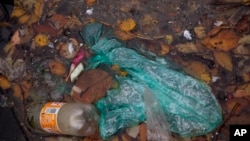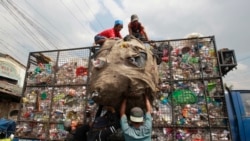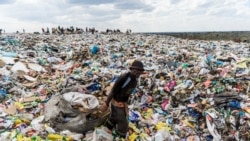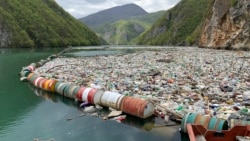Researchers have identified a new bacterium that feeds on polyurethane, a kind of plastic that is difficult to recycle or destroy.
Scientists say the discovery could help reduce a flood of hard-to-recycle plastics that are ending up in the world’s landfills and polluting oceans.
A team from the Helmholtz Center for Environmental Research in Leipzig, Germany, found the new strain of soil bacteria. It was identified in an area that contained a large amount of plastic waste.
The team discovered the bacteria were feeding on polyurethane diol, a substance widely used in many different products.
The researchers estimated that in 2015, polyurethane made up 3.5 million tons of Europe’s plastics.
One problem is that recycling polyurethane requires a lot of energy. The plastic material does not melt when heated. Most polyurethane-based products end up in landfills, where they can release dangerous chemicals.
The team found that the bacterium, identified as Pseudomonas putida, can produce enzymes that eat away at polyurethanes. This would make it possible to break down the material in the environment.
The results were recently reported in a study in the publication Frontiers in Microbiology.
Hermann Heipieper helped write the report. He said in a statement the finding “represents an important step in being able to reuse hard-to-recycle (polyurethane) products."
The research is part of a European Union program that seeks to find useful microorganisms. The goal is to identify living things that can help turn oil-based plastics into substances that can be broken down biologically.
Similar experiments have been carried out in the past.
In 2011, Yale University students discovered a fungus that could feed on polyurethane plastic even in a place without air, like at the bottom of a landfill.
Since then, scientists around the world have identified other kinds of fungi that can break down polyurethane. In 2017, a team of scientists identified a fungus that can feed on plastic by breaking down the main chemicals holding it together.
The German study noted that plastic-eating bacteria could be easily controlled and produced for industrial use. The researchers said the next step is to identify more information about the bacterial enzymes that can break down polyurethane.
Some scientists advise against introducing man-made enzymes or microorganisms into the environment that could be harmful.
Scientist Douglas Rader wrote about the issue in a 2018 article for the Environmental Defense Fund. He said much more study should be carried out to learn about “the complex relationships between plastics and marine ecosystems.” Such research is needed “before we can take drastic action such as” putting plastic-eating bacteria into the ocean, Rader wrote.
The group Plastic Oceans International reports that scientists estimate more than 8 million tons of plastic are thrown into the world’s oceans every year.
An estimated 300 million tons of plastic is produced yearly worldwide. Plastic Oceans International says about half of that amount is created for one use only.
I’m Bryan Lynn.
Bryan Lynn wrote this story for VOA Learning English, based on reports from the Helmholtz Center for Environmental Research, VOA News and Frontiers in Microbiology. Mario Ritter, Jr. was the editor.
We want to hear from you. Write to us in the Comments section, and visit our Facebook page.
________________________________________________________________
Words in This Story
recycle –v. to reuse something that has been used before often in another way
strain – n. a type of disease or plant
enzyme – n. a chemical substance produced by living cells that makes particular chemical reactions happen in animals and plants
fungus– n. a type of plant without leaves that gets its food from other living or decaying things
ecosystem – n. a biological community of interacting organisms and their physical environment
drastic – adj. sudden or extreme










